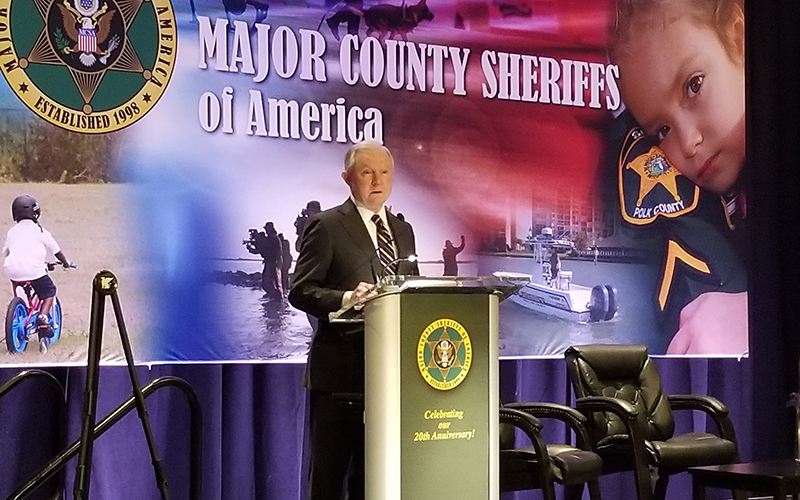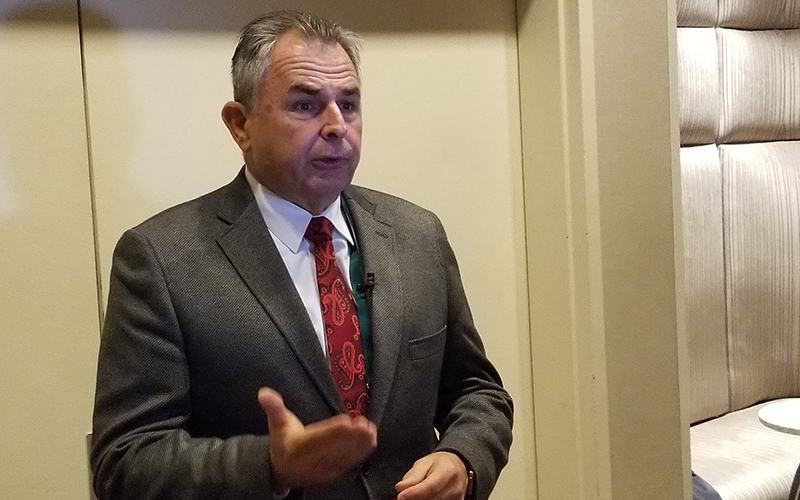
Attorney General Jeff Sessions’ speech to the Major County Sheriffs of America talked about a broad approach to fighting the opioid epidemic, in addition to touching on immigration reform and the deadly Florida high school shooting. (Photo by Philip Athey/Cronkite News)

Pima County Sheriff Mark Napier welcomed Attorney General Jeff Sessions approach to fighting the opioid epidemic, which targets prescribing as well as law enforcement. But he said local officials need more federal funding. (Photo by Philip Athey/Cronkite News)
WASHINGTON – Attorney General Jeff Sessions said authorities will not “cede a single community, one block or one street corner, to violent gangs and drug dealers” in the fight against opioids, a crisis that has claimed 910 lives in Arizona since June.
Sessions’ remarks came during a wide-ranging speech to the Major County Sheriffs of America that touched on everything from immigration reform to Wednesday’s deadly school shooting in Florida.
Pima County Sheriff Mark Napier said at the speech that he appreciates Sessions’ passion, but said he hopes to see more money “trickling down” to the local level to help sheriffs and other elected officials in the fight.
“We’re simply not seeing that money trickle down to the local level where local sheriffs and local elected officials can say, ‘This is the problem in our county, this is where we need to put those moneys to use,'” Napier said.
Sessions, speaking to an appreciative crowd of sheriffs, laid out a plan to attack the opioid crisis on several fronts. It included working closely with local officials, targeting enforcement against doctors who overprescribe and using data to find doctors that are criminally and unethically over prescribing opioids, then allowing federal prosecutors to push for the maximum penalty in those cases.
He acknowledged that opioid addiction is different than previous drug epidemics because “a substantial portion of heroin and fentanyl addictions started with prescription drugs.” Through both changes in medical practice and enforcement, Sessions plans to “reduce our drug prescriptions by doctors, lawful and unlawful … and we’re going to reduce our overdose deaths.”
“We will not stand by and watch violence and addiction rise,” Sessions said.
Napier agreed that going after doctors who are acting criminally is necessary to end this crisis.
-Cronkite News video by Austen Bundy
“We need to work with our federal partners … to identify those doctors and bring them to justice because they are part of the problem,” he said.
The problem reaches beyond just the number of pills in circulation, Napier said. Legal prescriptions have increased the lethality of opioids because people who were “overprescribed painkillers by doctors” turn to illegal drugs when they can no longer get a prescription, illicit drugs that can be deadly.
“And then we have the fentanyl deaths because they think they’re taking a pill they’re used to which is actually now laced with fentanyl and now that’s causing overdoses,” Napier said.
In June, Gov. Doug Ducey declared the opioid crisis a statewide health emergency and in January he signed the Arizona Opioid Epidemic Act that is aimed at reining in prescriptions and eases access to treatment, among other changes.
The crisis hasn’t gotten worse since June, Napier said, but it hasn’t gotten better, either.
“It’s about stable, and stable is not good because it is a significant problem,” he said. “Too many people are dying too many overdoses.”
Napier said he appreciates the support his department gets from the federal and state governments, but that more money needs to reach the local level where it can be used more effectively. It’s not just a law enforcement problem, he said.
“Every time somebody ODs (overdoses) EMS responds, law enforcement responds, you have the medical community responding,” Napier said. “This is a terrific multifaceted problem.”
Even if he gets all the money he needs, Napier understands that the opioid crisis is different: It will take more than just extra law enforcement officers on the ground to solve.
“We cannot arrest our way through this problem, we are going to have to use this as a public health problem,” he said, calling for a “more thoughtful approach with education and enforcement.”